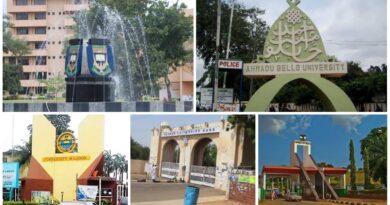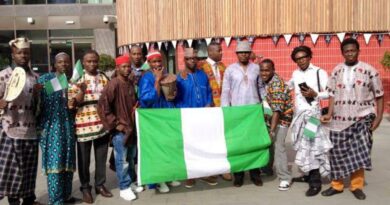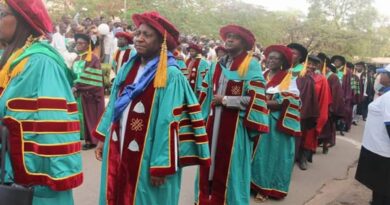This Thing Called ‘Boko’!
By Ismail Misbahu
In it, there lies a dangerous legend growing at a speed faster than the growing meadows in the fen, this ‘Boko’! It means different things to different people.
The most popular notion implied in the concept of ‘Boko’ has been its association with the utter vulgarity of today’s ‘Boko Haram’ – its decorousness. Whereas the literal meaning in this coinage refers to Western education as Islamically forbidden, its technical meaning refers to ‘Westernization’ as ‘sacrilegious’.
However, it’s crystal clear that many of the pretenses imbued in the teachings of BH−whether sacrilegious or forbidden have disagreed with those of Islam.
However, the most dangerous legend associated with this ‘Boko’ as preserved in the old historical notes, and still aching over in our memories today has been the hostile abhorrence, still in the Northern region, of anything ‘Western’ (or simply the ‘Nassara thing’) including Western Education.
Despite the significance in the past, of the influence of the Native Authorities, the fear that their children would be lured into accepting Christian gospel through the teaching of Bible and enforced listening of classical British music in colonial schools, many northerners detested this ‘Boko’, and consequently, therefore, placidly rejected Western education.
In addition to their suspicion, many northerners considered Western education as morally evil, because it tended to drag their children into becoming “Yan Iska”, through the readings of classical British novelists, like Charles J.H. Dickens, Rider Haggard−a.k.a ‘KBE’ among several others.
In addition, various plays such as ‘Henry IV’, ‘As You Like It’, ‘The Mid-Summer Night Dream’; and of course other games like Badminton, Squash Hockey, Lawn Tennis etcetera also re-enforced this sentiment.

Drawn from these old memories, many in today’s Northern Nigeria seems to perceive ‘Boko’ as mere shady habits – of ‘cisgender romance’: dancing, dressing, hanging out with friends, talking/charting, eating, drinking, and all sorts of the art of the West.
In the post-modern world, however, this perception closely matches the relaxed ambiance in today’s World-of-dress-sex-and-money! Fortunately, the educated as well as the experienced elite from the region, notwithstanding, were, contrarily an exception rather than the rule.
This is for the simple fact that not all who gained entry into Western education were ‘habitually’ Western. The decades-old syllable, ‘Glocalization’−thinking globally and acting locally’ no doubt deprecates the indulgence that’s today’s all ‘Boko’−the name with which we’re all bad-mouthed!
The legend associated with ‘Boko’ which I fancy to emphasize much here, and which possibly keeps pushing us into the morass, is that which underlined Western Education as valueless and of course presents its attendees (‘Yan Boko’) with the guilty of job insecurity, faultiness and down-right stupidity.
READ ALSO: An Analysis of Kidnapping, Insurgency and the Boko Haram Menace in Nigeria
This unjust lameness does not worth the image of a person attending a University, a College of Education, or a Polytechnic. Much as its plight becomes noticeable, the travails with this ‘Boko’ have been the result of the utter vulnerability of the Nigerian leadership – one that failed to synchronize the propelling motions of its national economy.
One that failed to impactfully acknowledge the significance of education in the pursuit of its market-oriented economy, industrialization, agricultural productivity−and food processing, health, art and entertainment, and many more that cannot be bettered up without the promotion of skill acquisition and manpower productivity.
The value of education has today become unsalable, and this is merely because of the growing perceptible and indeed unnecessary difference, in its purpose and objectives with those of the national economy. Education in Nigeria has always been abstracted and treated all alone, (as mere acquisition of certificate) away from the national economic need.
Advanced economies in the World direct their education (academic) researches towards achieving national economic goals and objectives. They do not, unlike we do, fall short of clear focus, inter-sectoral linkages, and coordinated national economic strategy.
To many, as it sounds in some part of the North today, ‘Boko’ is ‘asara’ (a complete waste of energy, time, and resources)! Reading and studying in the name of ‘Boko’ is, therefore, assumed to have become mere ‘fetishism of a jobless bibliophile−a desperate ‘bookworm’!
Those who subscribe to ‘Boko’ are seen in some quarters as the most gullible ones indeed! Trading (Kasuwanci) is now the powerful buzzword set in the opposite – misdirecting the educational purpose to the sheer follies of individualism and primitive accumulation.
Sometimes not so long, I had some discussions with a friend who suggested, beyond body language, that we all should withdraw this ‘Boko’ aside because the government cannot offer jobs to the teeming population today.
It’s obviously an undeniable fact that we all in his midst must know not to object. However, I recanted that population was not the case much as China could not survive economically without it; and America too, still complaining of its unnatural decline!
The true confession is that ‘Boko’, in the strict sense of its perceived shady habits, is not the pursuit of many. Learning rather is the greatest pursuit and, with an indefatigable sense of rigor, many could not dissipate from acquiring more, formally or informally until death.
I also composed to him that if what he meant by ‘Boko’ is Western education, the latter’s end, by contrast, does not, in its broader pursuit, only justifies government jobs. Much as education gears towards to, has been the attainment of an industrialized national economy. Sorry to say that Nigerian leadership does not match with this sense at virtually all levels.
Notwithstanding, the bitter truth is that the mass jobless Nigerian graduates are creatively lazy. This is in spite of the general market disorientation that dissipates from anything locally made and imitates excessively on foreign ones, as well as the growing dispirit caused by irresponsible leadership and the general lack of support/incentives from the government.
Graduates cannot, still, however, afford to fold their arms and sit akimbo while waiting for the ‘unknown’ day Nigeria may be borne again!
While bearing this in mind, the protest still is that jobless graduates today are ‘cursed’ not really because of their number, or more superficially because they did ‘Boko’, but potentially because of the abortive approaches by the Nigerian government towards working out a sincere, corrupt-free, and committed national development agenda 60 years after independence.
We all, therefore (both the boastful ‘Yan Kasuwa and blush-faced ‘Yan Boko’) must have felt sorry for ourselves as a country, because to even lament that Nigeria is too late in this sense, is of course, another waste of time. This country has been ruled for almost 40 years by now i.e. since shucking off, by this same President, of the Fourth National Development Plan (1981-1985) following the overthrow of the Civilian Government of Shehu Shagari.
What we had since then was mere flaws of wishy-washy programs such as the ‘Rolling Plan’, ‘Vision Plan’ Obasanjo’s NEEDS, Yar’adua’s 7-Point Agenda, Jonathan Transformation Agenda etc., which still failed to take the place of the previous development plans.
This indiscreet manner of not having a well-grounded national economic development plan has left the country with uncoordinated sectors of the economy ─ each standing ‘corruptly’ independent from another without inter-sectoral linkages between them. This blunder more so amounted to the failure of government not deliberate on a common framework that could drive the private sector forward to the direction of achieving national economic goals and objectives.
Tied with this clay-footed national fate, are our educational horizons that have so far become completely blurred without perspective. Interrogating the scary conclusion by Laurence Olatunde, that ‘since the 1st Republic, there really no purpose, no national objectives for education at all levels in Nigeria’ can hardly change the music today.
Education has not been given the right recognition it deserves. The leadership that may redeem its value is incautious to corruption and the attempt by the responsible few to desperately start from scratch has been fret and misguided by the complete shut-down of the industrial sector.
The current industrial crisis in Kaduna state is a good example right here. While Hassan Gimba called him ‘a small-sized political gadfly’, Mr. Kakanda referred to his actions as merely ‘classical’. El-Rufa’i’s actions, I argue gently, are not classical but indisputably ‘too late’. Classical in the sense of being obsolete is something that’s no longer needed in the modern sense.
By contrast, therefore we still need and welcome any attempt at revitalizing the industrial sector at present: failing or desperate! There’s no doubt that Governor El-Rufa’I is po-faced─he’s simply wrong. His driving poignancy, of sacking about 30,000 workers (or possibly 50,000 as Labour claims) since his assumption to office in 2015 can be wronged by the simple absence of other employment-driven sectors outside government.
The fact that 90% of the state allocation goes to the state civil service must have indeed, remained till today, the most disturbing development for the entire nation. El-Rufa’I must have felt bereft of alternative, as opportunities from other sectors of the economy have not pursued.
Nigeria is a country where the competing demand for the services of these ‘sacked’ workers and those of the jobless degree-bearing graduates haven’t been supplemented by other wages-driven sectors outside the government.
It will burst-open an intriguing commendation if graduates could secure fairly good wages by working in say, Cement or Fertilizer factories, Textiles, Petrochemicals, Agro-allied sub-sectors, Exotic and beverages, breweries among various others if they had not been comatose.
Although some of these industries are still functioning, many of them, because of their powerful market drive and profiteering, have become unruly outside the national economic framework. El-Rufa’I must repurpose himself to this realization before making any decision headlong.
To this end, I suggest we should understand that education is inseparable from the national economy. In the normal sense, the objectives set up for the latter defined the direction of the former.
It’s heart-rending that today, the growing gap in the generational mismatch of ideas keeps building bridges between Education and the rest of other sectors of the economy. Even more wretchedly, is the dying purpose of Education because of the failing national economic-cum-leadership prospects.
Here, from the foregoing, comes into realization the dangerous urban legend ‘Boko’─echoing something as worthless as it increasingly becomes lenient to Government─the only job creator in this sense. OMG!!
Misbahu wrote via: Ismailmusbahu15@gmail.com
For Advert Placement, Sponsorship, support, Article submission, suggestion, etc, Contact us: info@theabusites.com, +2349015751816 (WhatsApp)








